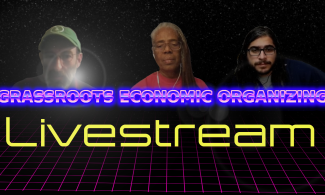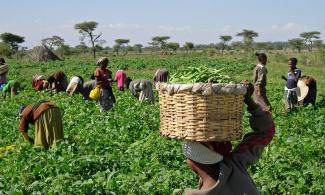
This is a clip from something new we've been trying: livestreaming. We thought it would be fun to get together for some informal conversation about the stories we post here on the website, and this increasingly popular format seemed like a good way to do it. It's still a little rough around the edges, but we're getting the hang of things. Here's a short clip from last month's stream. We'll be doing our livestreams on the second Monday of the month at 7 pm Eastern.
In this clip Josh, Ajowa, and Chris share their thoughts on Venezuela's Cecosesola co-op network, why we don't hear more about them in the US, and a good idea of theirs that might make a good fit here.
Transcript
Josh: So, once again, we have a couple of articles about Cecosesola cooperative in Venezuela. I found a nice little short video that they produced not too long ago, and I thought it was a good introduction, so I went ahead and made a transcript for it. Something I like to do is find some audio or video content that is worthy and needs to be as widely accessible as possible. So anything I think about Cecosesola, falls into that category. The video is definitely worth a watch here on YouTube. This cooperative is incredibly impressive because it has zero hierarchy there. It has no CEO, no board of directors, no managers. It is 100% horizontal.
And they are, as it says here, they have 25,000 families who are involved with their cooperative funeral services. They each contribute 20 cents a week, and they get funeral services for up to nine family members. They have 100,000 families that shop at their food fairs. They produce 700 tonnes of fruits and vegetables a week. They've got 50 families and seven small processing plants. They produce their own pasta, their own granola, honey, fruit, pulp, seasonings, vanilla, household cleaning products. They've got their own bank, they have their own hospital. And all of this, as they say, without adopting the culture of the bosses. They say right here, “We began with the traditional organization structure, with a board of directors, managers and employees. But in the process, we discovered new ways of getting things done. Day by day, we strive to transcend the individualism and egotism we carry within us, by rotating tasks and continuously reflecting on our daily behavior…. we no longer have managers, nor our board of directors, nor any domineering structure.”
So super. Yes, very interesting. And I was thinking about it to start us off and kind of with this spicy take: I was thinking about why we don't hear barely anything at all about Cecosesola, despite the fact they've been around for, I think, 50 years or so, and that they're very large, and they're even in our hemisphere. But we don't hear really anything about them, but only recently in the last couple of years I even was made aware of them, whereas we know a whole lot about Mondragon, right? Everybody knows Mondragon. Nobody knows Cecosesola. Why?
I was thinking: I wonder if it has something to do with the fact that most of the people in the US who are studying co-ops, into co-ops, developing co-ops, tend to be from a certain class of people, little more of the maybe professional, managerial class sorts, definitely more professional, more kind of academic. And something like Cecosesola, as compared to Mondragon, there's no place–There are no professional managerial people. There are no positions like that in Cecosesola, right? And so if you're a [professional middle class] type of person and you're looking at these different co-ops, Mondragon, like, “Oh, well, I recognize that. And there's a place for me there.” Right? And it's up in the hierarchy. Whereas in Cecosesola, there's no hierarchy. So those of us, of course, who always end up at the bottom of the hierarchy, Cecosesola seems pretty good compared to even something like Mondragon, which certainly has its issues, despite being head and shoulders above most other companies in their industry. But anyway, so that was my thought on hy something like Cecosesola gets very little play in our country.
Ajowa: Yeah. I think you make a great point there. You're right. We all hear about Mondragon. But this one we've been pretty silent on. And I was thinking that their work is so important because we don't know where our economy is headed, and they are really providing a model for us to follow. If things do break down in the economy, how we can take care of our own needs. So it’s really important. And I'm glad that GEO can be a vehicle for giving them more publicity and other people in this country knowledge about them, so that we might be able to follow their lead.
Chris: What you're mentioning, Josh, kind of reminds me how some industries we don't have to continue to develop, and one of them, I hate to say it, but well, I don't hate to say it, but it's probably a little uncomfortable to say it. But one is a lot of the legal industry. So much of oppression in the United States is from everything being based through all these laws and all that. That's one of the things I think about, too: what are some industries that we don't need to keep developing? And part of that is essentially hierarchy, right? Because a lot of these, some of these industries, they just create hierarchy or they're used to maintain hierarchies. I wonder also who doesn't want to be accused of being like a Chavista or I wonder if anybody, if any of that stuff gets equated to being a supporter of Hugo Chavez or something because–it's weird. Sometimes I'll see anti-cooperative–It's so bizarre–I don't know, they're just bots or something. But online when people mention socialism, communism, and out of nowhere people will start criticizing cooperatives. And I'll be like, “What does that have to do with?-- It doesn't have anything to do with that.” Cooperatives develop outside of those movements as well. And different types of–those things can mean many different things.
One thing that I was thinking about recently as we're scrolling through it, and I didn't really think about this the first time that I read it was the whole idea of the–the practice about the funerals. And that's kind of here in the United States already, in my opinion, the need for that, because I've had that conversation with my family, too, where we were talking about planning for our deaths. And we recognize, almost everyone we know, it's just kind of popular for no one to really ever be prepared, in our circles, for the death of somebody. And I think my brother put it–I think he's making a joke, but I feel it's a proletarian joke. And he was like, “I don't want to be out selling barbecue plates to bury my mom”. But I guess the implication is not being prepared. I mean you can do that within a cooperative framework, and I think that would be okay.
But I feel that happens because so many people, I see, whenever they die, I'm always just waiting for the GoFundMe to happen. And that happens so often. So I think that's probably a cooperative solution that's really needed in a lot of communities because a lot of people are just so slammed. A lot of us can't even cover the costs of the death of a loved one.
Citations
GEO Collective (2023). Cecosesola, Hierachy, and Funeral Co-ops. Grassroots Economic Organizing (GEO). https://geo.coop/articles/cecosesola-hierachy-and-funeral-co-ops





Add new comment